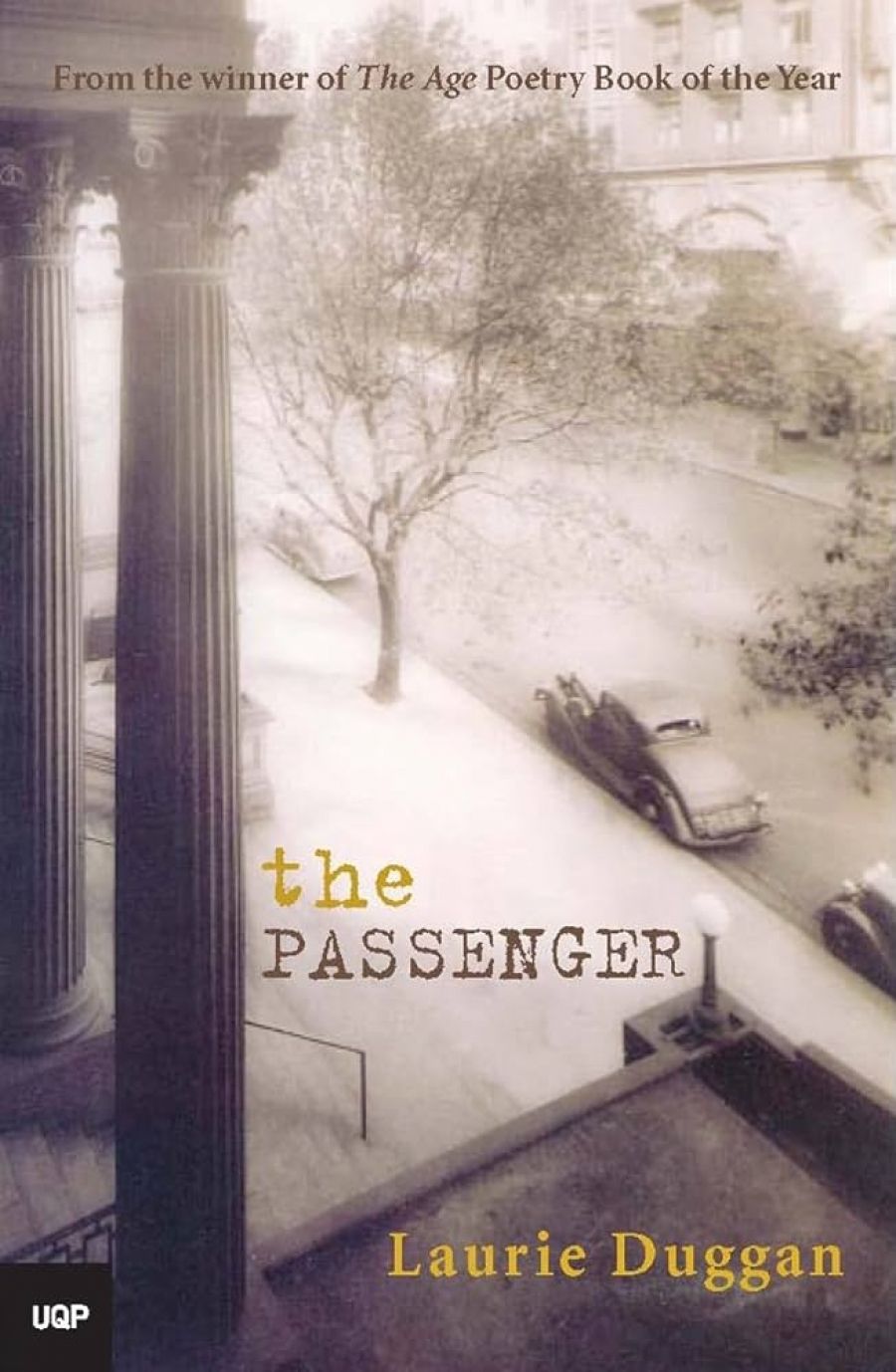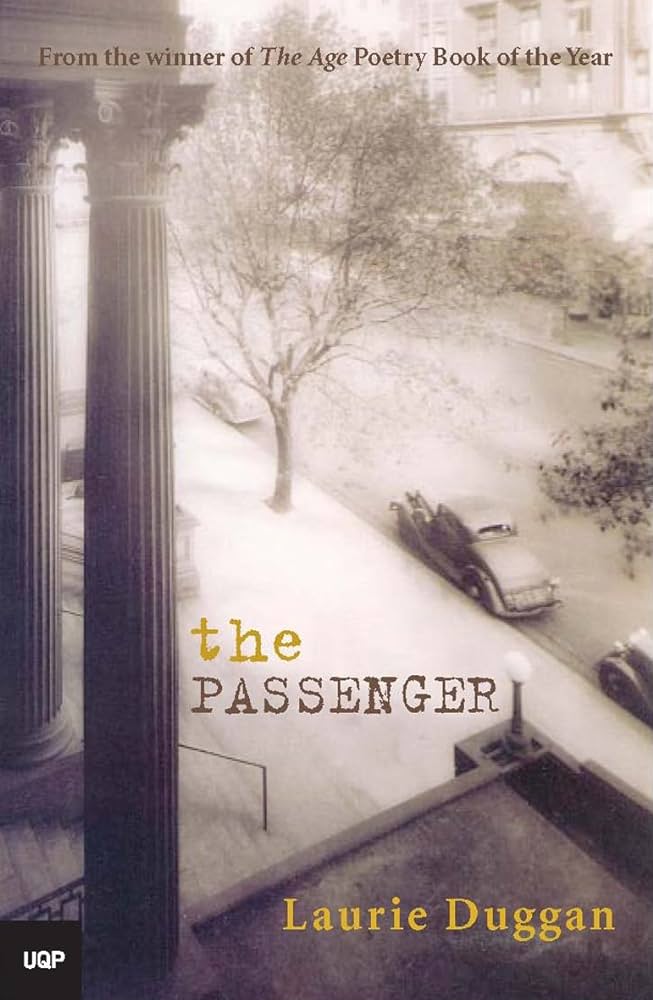
- Free Article: No
- Contents Category: Poetry
- Review Article: Yes
- Article Title: Conscious citizen
- Online Only: No
- Custom Highlight Text:
How to convey the pleasures of a whole collection of Laurie Duggan’s poetry? They are so various, one reason why Duggan is a source of perplexity to anthologists in search of a definitively characteristic poem. Anything as long and wilfully extravagant in spacing and layout as the anti-rhapsody ‘September Song’ almost automatically excludes itself; something epigrammatic then, say ‘A Little Book of Wisdom’ – but what about a virtuoso pastiche, the sonnets of ‘In Memory of Ted Berrigan’, or a ‘Blue Hills’ poem, with that imagist ‘minimalistic elegance’, which ‘Upside down’ declares: ‘unattractive / as the description of a potential residence / though ok if applied to / a book of poems ... my poems.’
It is even more difficult to find a Duggan poem that will slot neatly into the discourse of a thematic anthology. Against the grain of solidity in so much Australian poetry, there is something elusive here, an unreadiness to be ‘formulated, sprawling on a pin’ like that prototype of modernist angst Prufrock, whose ‘Do I dare to eat a peach?’ mischievously morphs to ‘Do I dare to eat a Porsche?’ in ‘Fantasia on a Theme by TS Eliot’. Mischief is part of Duggan’s very considerable satirical armoury against solemnity: consider ‘this country is my mind’: ‘just two minutes after / Les Murray became a republic / somebody cancelled my visa.’ But mischief is not all; there is something coldly sobering about this other glimpse Duggan offers of the relationship between politics and poetry: ‘At the centre of empire / the poets, stitched, bound / and acid-free.’
- Book 1 Title: The Passenger
- Book 1 Biblio: UQP, $23.95 pb, 89 pp
- Book 1 Cover Small (400 x 600):

- Book 1 Cover (800 x 1200):

It is even more difficult to find a Duggan poem that will slot neatly into the discourse of a thematic anthology. Against the grain of solidity in so much Australian poetry, there is something elusive here, an unreadiness to be ‘formulated, sprawling on a pin’ like that prototype of modernist angst Prufrock, whose ‘Do I dare to eat a peach?’ mischievously morphs to ‘Do I dare to eat a Porsche?’ in ‘Fantasia on a Theme by TS Eliot’. Mischief is part of Duggan’s very considerable satirical armoury against solemnity: consider ‘this country is my mind’: ‘just two minutes after / Les Murray became a republic / somebody cancelled my visa.’ But mischief is not all; there is something coldly sobering about this other glimpse Duggan offers of the relationship between politics and poetry: ‘At the centre of empire / the poets, stitched, bound / and acid-free.’
Witty, one says – intelligently self-reflexive, eclectically literate, technically artful, a touch surrealistic, an original with an uppercase O. ‘Oh, you mean a poet’s poet?’ Well, yes – poets and their poetry are as dominant a presence here as lovers or landscapes are in the work of others. It is not so much the occasional display of that camaraderie between local poets – ‘Dear Ken, hello’, ‘Thanks Richard’–that can irritate, although not in the poignant dreamlike moment of:
I’m walking the corridors of a large building. I keep seeing or hearing John Forbes in the distance but when I get there he has gone. Finally I catch up with him. I say ‘I thought you didn’t want to talk to me’. He says ‘I thought you didn’t want to talk to me’. (‘Animal Farm’)
It is rather that Duggan is a citizen of the international republic of poets, teasing as well as informing the reader with a note that the poem ‘In Memory of Ted Berrigan’ ‘scrambles and occasionally misquotes lines from a host of sources including Berrigan himself, John Ashbery, Kenneth Koch, Martin Johnston, Alan Wearne, Kristin Hersh, Gilbert Sorrentino, Blondie, Mike Davis and even myself’.
Poetry itself – how it works and what it means to be a poet – figures largely in this collection, notably in the poem ‘A Conscious Citizen’, where William Carlos Williams provides a central reference point around which coalesce passages like:
Last week, a bad American poet
spoke about forms, her use
of the sonnet.I told her
(mischievously) to read Ted Berrigan
and Bernadette Mayer, of whom
she had never heard. These
would supply a new filter
for mother dying of cancer.
There follows shortly after, as if in retraction: ‘We all want the poem to escape / from our lives ... or at least / our lives to escape from the poem.’ We don’t have to believe theoretical hyperbole that every poem is about poetry to be able to grant poets as much right to talk about poetry as about anything else, provided he or she does it well. Duggan does. Does this make him that even more forbidding phenomenon, a critic’s poet? After all, his literary peers in the Association for Australian Literature have awarded him the ALS Gold Medal, but it’s worth noting that their citation calls him one of ‘the most entertaining poets in Australia’, something not necessarily associated with a ‘critic’s poet’ or a ‘poet’s poet’, a term he himself pillories in the entanglement of ‘Market research’: is your poetry poetry like poetry / people who like poetry like?’
From the same sequence, ‘Animal Farm’, comes this passage that goes some way towards characterising this collection (from ‘The Roy Fisher Mobile Phone Poem’): ‘I’m on a bus / traversing the nondescript.’ The idea of traversing, crossing surfaces and countries, is in the collection’s title. But the eye of this passenger is a prismatic one that can transform the unwritten (the nondescript) into a dazzle of words, revitalising literature, politics, places rubbed dull and thin with custom. When we encounter ‘I have measured out my wife with coffee spoons’, it is not so much that Eliot is being parodied, or ‘high’ literature being subverted by the mundane, as that we are being invited to relish the absurdity of our trust in the patina of meaning, the grip of phonemes on significance. Duggan’s linguistic playfulness challenges us not to be slothfully single-minded, to remember when we read ‘as though all this spectacle / were some trompe l’oeil / you had to step through / to reach the mundane’ (‘Blue Hills 65’) that ‘mundane’ does not have to be a disparaging dismissal of the ordinary, but can speak to us of the worldly, the mortal earth where we live and have our being, and can enjoy reading poetry like this.


Comments powered by CComment